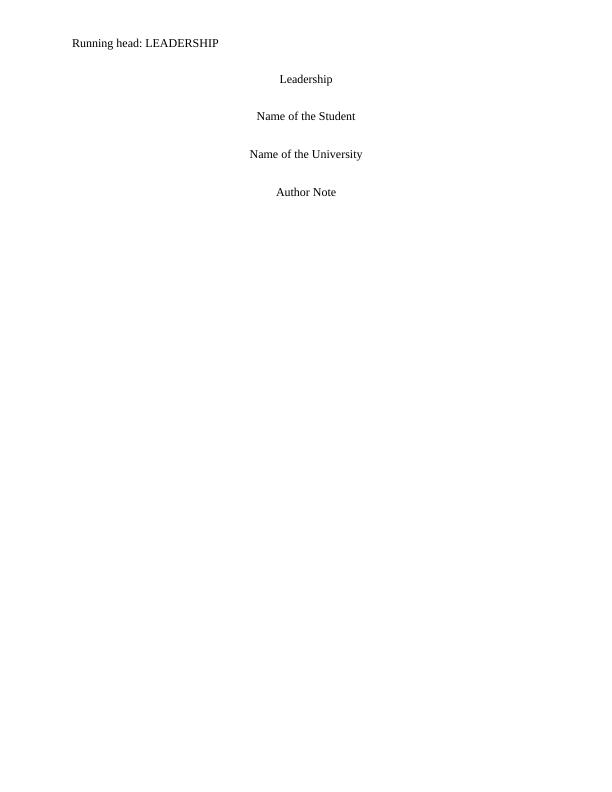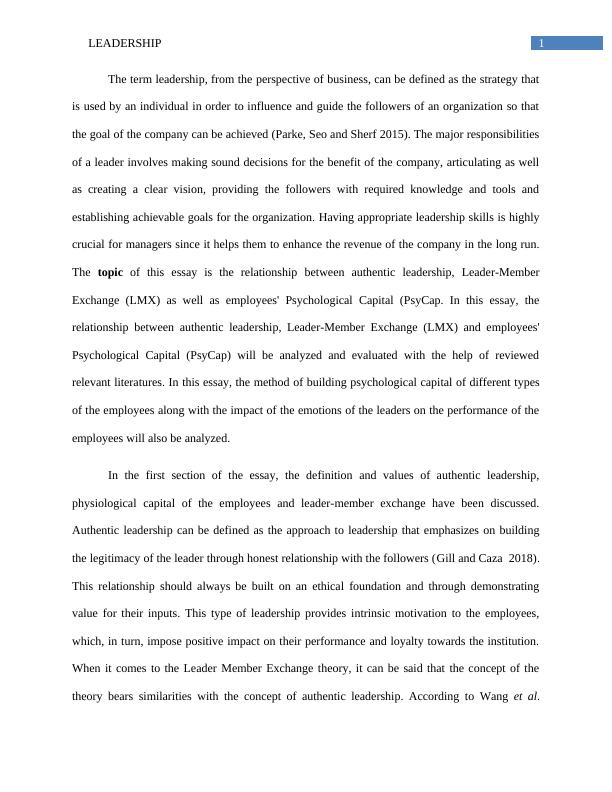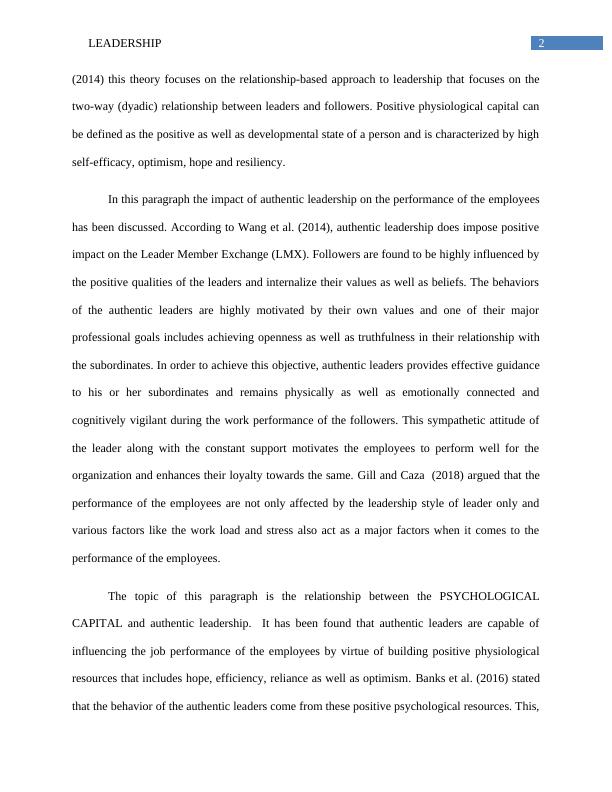Relationship between Authentic Leadership, Leader-Member Exchange and Psychological Capital
Added on 2023-05-28
10 Pages2780 Words465 Views
Running head: LEADERSHIP
Leadership
Name of the Student
Name of the University
Author Note
Leadership
Name of the Student
Name of the University
Author Note

1LEADERSHIP
The term leadership, from the perspective of business, can be defined as the strategy that
is used by an individual in order to influence and guide the followers of an organization so that
the goal of the company can be achieved (Parke, Seo and Sherf 2015). The major responsibilities
of a leader involves making sound decisions for the benefit of the company, articulating as well
as creating a clear vision, providing the followers with required knowledge and tools and
establishing achievable goals for the organization. Having appropriate leadership skills is highly
crucial for managers since it helps them to enhance the revenue of the company in the long run.
The topic of this essay is the relationship between authentic leadership, Leader-Member
Exchange (LMX) as well as employees' Psychological Capital (PsyCap. In this essay, the
relationship between authentic leadership, Leader-Member Exchange (LMX) and employees'
Psychological Capital (PsyCap) will be analyzed and evaluated with the help of reviewed
relevant literatures. In this essay, the method of building psychological capital of different types
of the employees along with the impact of the emotions of the leaders on the performance of the
employees will also be analyzed.
In the first section of the essay, the definition and values of authentic leadership,
physiological capital of the employees and leader-member exchange have been discussed.
Authentic leadership can be defined as the approach to leadership that emphasizes on building
the legitimacy of the leader through honest relationship with the followers (Gill and Caza 2018).
This relationship should always be built on an ethical foundation and through demonstrating
value for their inputs. This type of leadership provides intrinsic motivation to the employees,
which, in turn, impose positive impact on their performance and loyalty towards the institution.
When it comes to the Leader Member Exchange theory, it can be said that the concept of the
theory bears similarities with the concept of authentic leadership. According to Wang et al.
The term leadership, from the perspective of business, can be defined as the strategy that
is used by an individual in order to influence and guide the followers of an organization so that
the goal of the company can be achieved (Parke, Seo and Sherf 2015). The major responsibilities
of a leader involves making sound decisions for the benefit of the company, articulating as well
as creating a clear vision, providing the followers with required knowledge and tools and
establishing achievable goals for the organization. Having appropriate leadership skills is highly
crucial for managers since it helps them to enhance the revenue of the company in the long run.
The topic of this essay is the relationship between authentic leadership, Leader-Member
Exchange (LMX) as well as employees' Psychological Capital (PsyCap. In this essay, the
relationship between authentic leadership, Leader-Member Exchange (LMX) and employees'
Psychological Capital (PsyCap) will be analyzed and evaluated with the help of reviewed
relevant literatures. In this essay, the method of building psychological capital of different types
of the employees along with the impact of the emotions of the leaders on the performance of the
employees will also be analyzed.
In the first section of the essay, the definition and values of authentic leadership,
physiological capital of the employees and leader-member exchange have been discussed.
Authentic leadership can be defined as the approach to leadership that emphasizes on building
the legitimacy of the leader through honest relationship with the followers (Gill and Caza 2018).
This relationship should always be built on an ethical foundation and through demonstrating
value for their inputs. This type of leadership provides intrinsic motivation to the employees,
which, in turn, impose positive impact on their performance and loyalty towards the institution.
When it comes to the Leader Member Exchange theory, it can be said that the concept of the
theory bears similarities with the concept of authentic leadership. According to Wang et al.

2LEADERSHIP
(2014) this theory focuses on the relationship-based approach to leadership that focuses on the
two-way (dyadic) relationship between leaders and followers. Positive physiological capital can
be defined as the positive as well as developmental state of a person and is characterized by high
self-efficacy, optimism, hope and resiliency.
In this paragraph the impact of authentic leadership on the performance of the employees
has been discussed. According to Wang et al. (2014), authentic leadership does impose positive
impact on the Leader Member Exchange (LMX). Followers are found to be highly influenced by
the positive qualities of the leaders and internalize their values as well as beliefs. The behaviors
of the authentic leaders are highly motivated by their own values and one of their major
professional goals includes achieving openness as well as truthfulness in their relationship with
the subordinates. In order to achieve this objective, authentic leaders provides effective guidance
to his or her subordinates and remains physically as well as emotionally connected and
cognitively vigilant during the work performance of the followers. This sympathetic attitude of
the leader along with the constant support motivates the employees to perform well for the
organization and enhances their loyalty towards the same. Gill and Caza (2018) argued that the
performance of the employees are not only affected by the leadership style of leader only and
various factors like the work load and stress also act as a major factors when it comes to the
performance of the employees.
The topic of this paragraph is the relationship between the PSYCHOLOGICAL
CAPITAL and authentic leadership. It has been found that authentic leaders are capable of
influencing the job performance of the employees by virtue of building positive physiological
resources that includes hope, efficiency, reliance as well as optimism. Banks et al. (2016) stated
that the behavior of the authentic leaders come from these positive psychological resources. This,
(2014) this theory focuses on the relationship-based approach to leadership that focuses on the
two-way (dyadic) relationship between leaders and followers. Positive physiological capital can
be defined as the positive as well as developmental state of a person and is characterized by high
self-efficacy, optimism, hope and resiliency.
In this paragraph the impact of authentic leadership on the performance of the employees
has been discussed. According to Wang et al. (2014), authentic leadership does impose positive
impact on the Leader Member Exchange (LMX). Followers are found to be highly influenced by
the positive qualities of the leaders and internalize their values as well as beliefs. The behaviors
of the authentic leaders are highly motivated by their own values and one of their major
professional goals includes achieving openness as well as truthfulness in their relationship with
the subordinates. In order to achieve this objective, authentic leaders provides effective guidance
to his or her subordinates and remains physically as well as emotionally connected and
cognitively vigilant during the work performance of the followers. This sympathetic attitude of
the leader along with the constant support motivates the employees to perform well for the
organization and enhances their loyalty towards the same. Gill and Caza (2018) argued that the
performance of the employees are not only affected by the leadership style of leader only and
various factors like the work load and stress also act as a major factors when it comes to the
performance of the employees.
The topic of this paragraph is the relationship between the PSYCHOLOGICAL
CAPITAL and authentic leadership. It has been found that authentic leaders are capable of
influencing the job performance of the employees by virtue of building positive physiological
resources that includes hope, efficiency, reliance as well as optimism. Banks et al. (2016) stated
that the behavior of the authentic leaders come from these positive psychological resources. This,

End of preview
Want to access all the pages? Upload your documents or become a member.
Related Documents
The Positive Leader: Authentic Leadership, Leader-Member Exchange, and Employees' Psychological Capitallg...
|11
|2626
|344
Effective Leader Member Exchange .lg...
|9
|2293
|485
Positive Leadership and Employee Psychological Capitallg...
|13
|2779
|70
Psychological Capital Essay 2022lg...
|8
|2637
|29
The Positive Leader: Relationship between Authentic Leadership, LMX and Psychological Capitallg...
|9
|2980
|188
positive leader Assignment PDFlg...
|9
|2946
|23